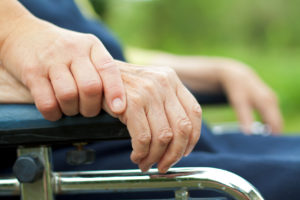
Quadriplegia is the most serious consequence you can face from a spinal cord injury short of death. Quadriplegia means you experience at least some paralysis in all four limbs. It is often accompanied by paralysis that affects various organs and muscles, affecting digestion, bladder and bowel control, and even breathing.
Accident victims with a quadriplegia injury face a lifetime of medical issues. They also need substantial assistance with their mobility and meeting their daily needs.
Here is an overview of how a quadriplegia injury happens and the compensation that you might seek for one.
Table of Contents
What Does the Spinal Cord Do?

The spinal cord carries all of the nerve signals from your brain to your body below your neck. The nerves transmit these signals with a combination of chemistry and electricity. Nerve cells use ions to communicate with each other. Ions are charged particles that can quickly carry a signal up and down your nerves.
The signals carried by your nerves include:
Autonomic Signals
Autonomic signals control your involuntary responses from the muscles and organs responsible for:
- Heart rate
- Breathing
- Blood pressure
- Digestion
- Sweating and temperature control
- Sexual arousal
Bowel control and bladder control use some autonomic signals combined with some voluntary motor signals.
Motor Signals
Motor signals control muscles in response to conscious thoughts. These signals cause your body to move by contracting or extending muscles. When nerves cannot carry motor signals, you experience paralysis.
Sensory Signals
Sensory signals carry sensory information from your body to your brain. The sensory information that travels along your spinal cord includes texture, pressure, and temperature. A loss of sensory signals will cause numbness.
How Does a Quadriplegia Injury Happen?
Spinal cord injuries happen when the spinal cord nerves get severed or compressed. When a nerve gets severed, it can no longer carry nerve signals. The electrical signal cannot jump across a cut nerve.
The effects of a severed spinal cord depend on which nerves get cut. As the spinal cord travels down the spine, it branches out to the regions of your body. In your lower back, your spinal cord only carries the nerves for your lower limbs. Your spinal cord carries the nerves for virtually your entire body in your neck.
A quadriplegia injury happens when you suffer a spinal cord injury in your neck. Since most of the nerves have not yet branched off, the damaged nerves will cause complete or partial paralysis in all four of your limbs, hence the name “quadriplegia.”
You could also experience symptoms in your autonomic nervous system. Accident victims with quadriplegia may need a ventilator and feeding tube. They may also lose bowel and bladder control.
The nerves also lose sensory function. As a result, you will have some loss of sensation in the affected limbs. The limb may feel as though it is not there. Or you may have numbness or tingling in the affected limb.
Your spinal cord usually gets severed in one of two ways. An object could penetrate your spinal canal and cut the nerves. For example, glass or metal shards could sever your spinal cord if you get ejected through your windshield in a car accident.
A broken vertebra could also sever your spinal cord. When the vertebrae fracture, bone fragments can slip into the spinal canal and cut the nerves of your spinal cord.
Complete and Incomplete Quadriplegia Injury
The symptoms of a quadriplegia injury will depend on whether you have a complete or incomplete quadriplegia injury. In a complete quadriplegia injury, all of the spinal cord nerves get severed. This leaves your body completely isolated from your brain below the level of your injury.
In a complete quadriplegia injury, you will have total paralysis and loss of sensory function. Your muscles will not move, and your brain will not receive any information from the body.
You will also lose control of any autonomic functions below the injury site. If your diaphragm gets paralyzed, you might lose the ability to breathe without assistance.
In an incomplete quadriplegia injury, some but not all of the nerves in your spinal cord get severed. Incomplete quadriplegia will still affect all four of your limbs. But the degree of paralysis and sensory loss will vary depending on which nerves get severed.
An incomplete quadriplegia injury can produce symptoms such as:
- Paralysis on one side but not the other
- Paralysis of some muscles, like fingers, but not other muscles, like arms
- Muscle weakness and loss of dexterity rather than paralysis
Incomplete quadriplegia injuries also differ in prognosis from complete quadriplegia injuries. Doctors cannot repair either type of injury. But intense therapy can help people with incomplete quadriplegia injuries to regain some strength and control.
The brain has a property called neuroplasticity that allows it to remap intact nerves to control some areas that have lost nerve function. Physical therapy can retrain the brain.
What is the Severity of a Quadriplegia Injury?
The organs and muscles affected by a quadriplegia injury will vary depending on the location of the injury. Injuries higher in the neck will produce more severe injuries.
You have seven cervical vertebrae. Since you have nerve roots above and below each cervical vertebra, you have eight cervical nerve roots numbered C1 through C8.
An injury at C1 through C3 will often cause death. The nerves that control your diaphragm pass through here. You stop breathing when they get severed, and you will not survive your accident without immediate life support.
An injury at C4 will paralyze you from your neck down. You may need breathing support and a feeding tube.
An injury at C5 and C6 will usually leave you with control over your neck. You can probably breathe on your own. You will probably have paralysis below your shoulders.
Injuries at C7 and C8 will often allow you to control your shoulders. You may have control over some muscles in your arms and chest as well.
What Compensation Can You Recover for a Quadriplegia Injury?
You can pursue compensation for your losses when you suffer an injury due to someone else’s negligent or intentional actions.
The damages you suffer due to a quadriplegia injury will be substantial. You will need medical attention, physical therapy, and medication for the rest of your life. You will also need a caretaker to help you with your mobility and daily needs. To learn about seeking compensation after a quadriplegia injury, contact the law firm of Shaked Law Personal Injury Lawyers to schedule a free consultation.
